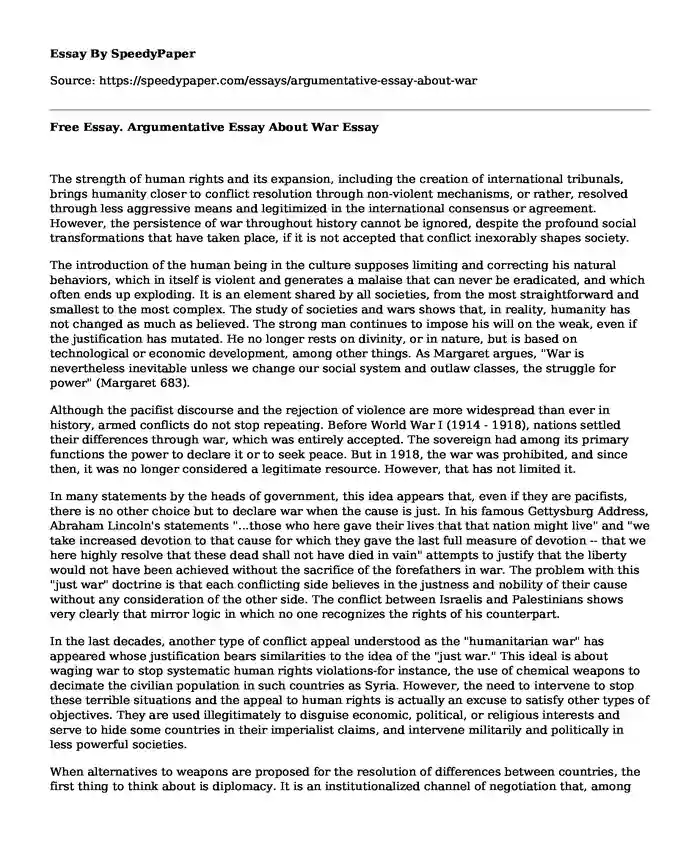
| Essay type: | Argumentative essays |
| Categories: | Discrimination War Social responsibility Social issue |
| Pages: | 3 |
| Wordcount: | 682 words |
The strength of human rights and its expansion, including the creation of international tribunals, brings humanity closer to conflict resolution through non-violent mechanisms, or rather, resolved through less aggressive means and legitimized in the international consensus or agreement. However, the persistence of war throughout history cannot be ignored, despite the profound social transformations that have taken place, if it is not accepted that conflict inexorably shapes society.
The introduction of the human being in the culture supposes limiting and correcting his natural behaviors, which in itself is violent and generates a malaise that can never be eradicated, and which often ends up exploding. It is an element shared by all societies, from the most straightforward and smallest to the most complex. The study of societies and wars shows that, in reality, humanity has not changed as much as believed. The strong man continues to impose his will on the weak, even if the justification has mutated. He no longer rests on divinity, or in nature, but is based on technological or economic development, among other things. As Margaret argues, "War is nevertheless inevitable unless we change our social system and outlaw classes, the struggle for power" (Margaret 683).
Although the pacifist discourse and the rejection of violence are more widespread than ever in history, armed conflicts do not stop repeating. Before World War I (1914 - 1918), nations settled their differences through war, which was entirely accepted. The sovereign had among its primary functions the power to declare it or to seek peace. But in 1918, the war was prohibited, and since then, it was no longer considered a legitimate resource. However, that has not limited it.
In many statements by the heads of government, this idea appears that, even if they are pacifists, there is no other choice but to declare war when the cause is just. In his famous Gettysburg Address, Abraham Lincoln's statements "...those who here gave their lives that that nation might live" and "we take increased devotion to that cause for which they gave the last full measure of devotion -- that we here highly resolve that these dead shall not have died in vain" attempts to justify that the liberty would not have been achieved without the sacrifice of the forefathers in war. The problem with this "just war" doctrine is that each conflicting side believes in the justness and nobility of their cause without any consideration of the other side. The conflict between Israelis and Palestinians shows very clearly that mirror logic in which no one recognizes the rights of his counterpart.
In the last decades, another type of conflict appeal understood as the "humanitarian war" has appeared whose justification bears similarities to the idea of the "just war." This ideal is about waging war to stop systematic human rights violations-for instance, the use of chemical weapons to decimate the civilian population in such countries as Syria. However, the need to intervene to stop these terrible situations and the appeal to human rights is actually an excuse to satisfy other types of objectives. They are used illegitimately to disguise economic, political, or religious interests and serve to hide some countries in their imperialist claims, and intervene militarily and politically in less powerful societies.
When alternatives to weapons are proposed for the resolution of differences between countries, the first thing to think about is diplomacy. It is an institutionalized channel of negotiation that, among other things, is to resolve conflicts without reaching confrontation. However, the experiences with diplomacy have proved much trouble in avoiding war because, in diplomatic work itself, many interests intersect. It is not a pure and clean environment. Diplomacy works with very little chance of defeating those strong economic interests and politicians. Therefore, as long as there is inequality among men, the injustices will remain a compelling reason for the declaration of wars for both warring opponents.
Works Cited
Lincoln, Abraham. The Gettysburg Address. Penguin UK, 2009.
Mead, Margaret. "Warfare Is Only an Invention-Not a Biological Necessity MARGARET MEAD." Conflict after the Cold War: Arguments on Causes of War and Peace (2015): 244.
Cite this page
Free Essay. Argumentative Essay About War. (2023, Jul 31). Retrieved from https://speedypaper.com/essays/argumentative-essay-about-war
Request Removal
If you are the original author of this essay and no longer wish to have it published on the SpeedyPaper website, please click below to request its removal:
- Free Essay on Terrorism Financing and Islamic Charities
- Free Essay on Organizational Conflicts in Hospitals
- Essay Sample: Resolution of Document Management Problems in the Immigration Law Firms
- The Policy of Immigration in USA, Free Essay for Students
- Corporate Crisis Management Essay Example
- Essay Sample. The Early Attachment and Development
- Paper Example. Lying Is Not an Act of Goodwill
Popular categories




